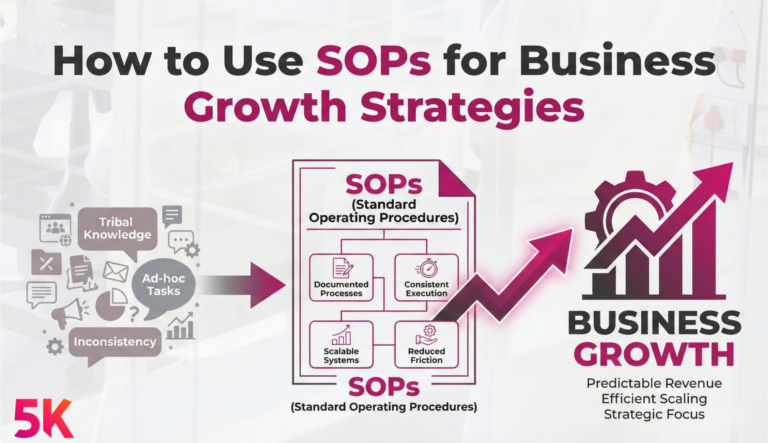While the industry debates Figma CEO Dylan Field’s recent observation that AI is “shifting and merging roles,” we’ve been building our team around this reality for years.
We saw this coming at 5K.
Field’s Insight
That everyone is becoming a “product builder” rather than a siloed specialist isn’t news to businesses focused on actual growth rather than departmental metrics. It’s a validation of what we’ve known through two decades of building revenue engines: the companies that win don’t have marketing departments. They have growth machines staffed by strategic generalists who understand the full picture.
The Problem With Traditional Marketing Roles
Here’s the uncomfortable truth C-suite executives face: your traditional marketing org chart is costing you money.
When your SEO specialist obsesses over keyword rankings without understanding conversion psychology (or if those keywords are even relevant), when your paid ads manager optimizes for clicks without considering lifetime customer value, when your content team creates “engaging” posts that don’t move revenue, you’re not building a business. You’re managing a collection of expensive hobbies.
Field’s research from Figma revealed that 72% of respondents cited AI tools as a primary driver behind role expansion.
But let’s be clear: AI isn’t creating this shift.
It’s exposing the inefficiency that was always there.
The best marketers have always been generalists who understood that traffic without conversion is vanity, that brand awareness without sales is theater, and that channel expertise without business acumen is incomplete.
The 5K Approach: Built for This Moment
At 5K, we don’t hire “SEO specialists” or “PPC managers.” We develop growth strategists who happen to have deep expertise in specific channels. There’s a critical difference.
Our team members understand the ProfitPaths® methodology, the framework that’s proven timeless precisely because it focuses on business fundamentals rather than platform tactics. While others chase algorithm updates and new ad features (we’re on top of those, by the way), we’ve spent 20 years refining a system that identifies your highest-value offering, your most profitable customers, and the most efficient path between them.
This isn’t coincidence. It’s intentionality.
When Field says “we’re all product builders,” he’s describing what we’ve been practicing: marketers who think like business owners, not channel operators. Every member of our team can discuss revenue attribution alongside technical SEO tactics or Meta ad campaign structure.
Why ProfitPaths® Fits Perfectly in This New Reality
The ProfitPaths® methodology is inherently anti-silo. It forces collaboration because it requires understanding the full customer journey:
- Step One identifies your IMPACT Offering — the products or services with the highest strategic value. This requires deep conversations between marketing, sales, product, and finance. No single “specialist” can make this determination alone.
- Step Two defines your IMPACT Prospect — the customers who provide maximum long-term value. This demands insights from customer success, sales data analysis, and market research. It’s cross-functional by necessity.
- Step Three creates Prospect Magnets that actually attract your ideal customers. This requires understanding content strategy, SEO, paid acquisition, email marketing, and conversion optimization simultaneously. You can’t create effective magnets if you’re only thinking about one channel.
- Step Four designs conversion systems that turn prospects into leads. This is where the merger of roles becomes most apparent — effective conversion requires understanding copywriting, user experience, technical implementation, and data analysis as an integrated system, not separate deliverables.
- Step Five selects channels strategically based on where your IMPACT Prospects actually spend time. This isn’t about “doing social media” or “running Google Ads.” It’s about understanding which combinations of channels create compounding effects.
Notice what’s missing?
Rigid job titles. Departmental boundaries. The artificial separation between “creative” and “analytical” team members.
The Compound Effect of Strategic Generalists
Field noted in his interview that 56% of non-designers now engage “a great deal” in design tasks, up from 44% just one year prior. This acceleration mirrors what we see in high-performing marketing organizations.
The companies growing most aggressively aren’t the ones with the most specialized teams. They’re the ones where team members fluidly move between strategy, execution, analysis, and optimization across multiple channels.
This creates a compound effect. When your content strategist understands paid acquisition, they create content that actually converts paid traffic. When your PPC specialist understands SEO, they don’t waste budget competing for keywords you could own organically. When everyone understands customer lifetime value, every decision gets evaluated against business impact rather than channel metrics.
Most marketing agencies stay stuck in the reaction cycle, chasing the latest platform update, celebrating engagement metrics, justifying their existence through activity rather than outcomes. We create frameworks that compound over time, so your business grows with less chaos and more control.
The goal is simple. The task is to keep it simple.
Simple does not equal basic. It means we’re growth-oriented, and every decision is made with your growth in mind.
What This Means for Your Organization
If you’re a CEO, CFO, or growth-focused executive, here’s what Field’s observation should trigger:
Audit your org chart. Do you have people with job titles, or do you have growth strategists who specialize in certain areas? There’s a difference. One focuses on task completion; the other focuses on business outcomes.
Question your metrics. Are your teams measured on channel-specific KPIs or on contribution to revenue? If your SEO team celebrates rankings without connecting them to qualified leads (or how they are the types of keywords that will produce leads for you when you hit those money-making spots in Google), you have a problem. If your paid ads team optimizes for lower CPAs without considering customer lifetime value, you’re leaving money on the table.
Invest in generalist development. The best marketing investment you can make isn’t another tool or platform. It’s developing your team’s ability to think strategically across the entire customer journey. Field noted that 53% of respondents said deep knowledge was still required to do tasks well, even with AI. This is precisely right, but the “deep knowledge” that matters isn’t just technical expertise. It’s understanding how all the pieces fit together to drive business growth.
The Timeless Core Beneath the Tactical Surface
Here’s why ProfitPaths® remains relevant regardless of which specific tactics or tools emerge: it’s built on business fundamentals that don’t change.
Your business needs profitable customers. Those customers need to discover you, understand your value, and choose you over alternatives. They need to have a good enough experience that they buy again and refer others. This cycle existed before digital marketing and will exist after whatever comes next.
AI doesn’t change these fundamentals. It just removes the excuse for not addressing them properly.
When Field talks about everyone becoming a “product builder,” he’s describing the inevitable evolution toward what we’ve always advocated: marketing that serves business growth rather than marketing that serves itself.
The Practical Application
What does this look like in practice? At 5K, it means:
- Our SEO strategists understand conversion rate optimization and can identify which rankings actually matter for revenue
- Our paid ads specialists understand content strategy and can create campaigns that align with organic initiatives
- Our content creators understand technical SEO and write with both user experience and search engines in mind
- Everyone understands customer psychology, sales cycles, and business economics
We don’t achieve this by hiring unicorns who magically possess every skill. We achieve it by:
- Hiring for strategic thinking first, technical skills second. We can teach someone Meta Ads Manager. We can’t teach someone to think strategically about business growth — and more importantly, to love it.
- Structuring teams around business objectives, not channels. We don’t have an SEO team and a PPC team. We have growth teams focused on specific ProfitPaths® for specific clients.
- Creating deliberate overlap and collaboration. Our best insights come when different expertise areas collide. We structure projects to force this collision.
The Bottom Line for Leadership
Field’s observation about merging roles isn’t a prediction, it’s a description of what’s already happening in high-performing organizations. The question for C-suite leaders isn’t whether this shift will happen. It’s whether you’ll lead it or react to it.
At 5K, we’ve been preparing for this reality by building a methodology that transcends tactical trends. ProfitPaths® works because it focuses on the unchanging fundamentals of business growth while remaining flexible about which specific tools and channels we deploy.
After working with businesses for 20 years — helping them grow from $8 million to $22 million in two years, generating $33 million in web sales from zero, achieving 606% SEO growth — we’ve learned something critical: the businesses that scale sustainably don’t have the most specialists. They have generalists who specialize.
They have growth strategists who understand that SEO, paid ads, content, email, and social media aren’t separate disciplines. They’re different tools in the same toolbox, deployed strategically to achieve the same goal: connecting your most profitable offering with your best customers in the most efficient way possible.
This has always been the path to profit. AI is just making it impossible to ignore any longer.
Ready to build a growth machine instead of managing marketing departments? Let’s talk about how ProfitPaths® can transform your team from channel specialists into business growth strategists.









